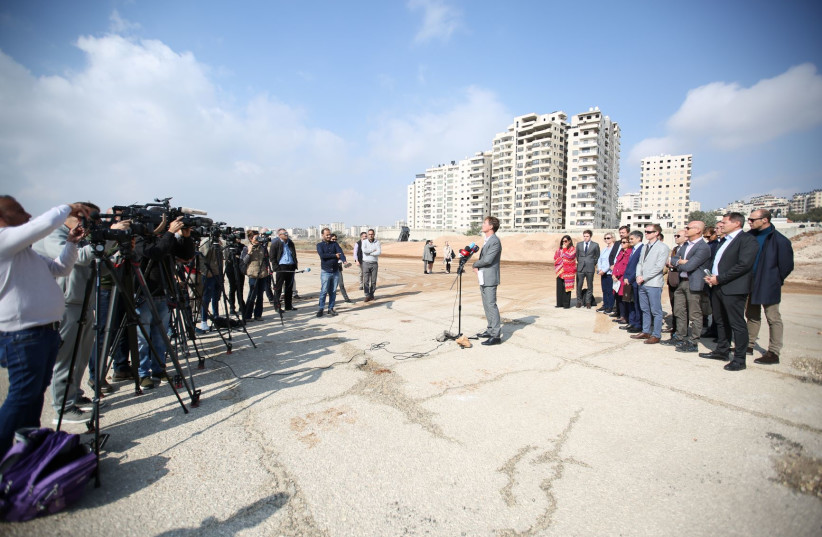November 21, 2021 was a devastating day for Jews worldwide, an all too painful reminder that peace may never be achieved.
A life taken all too soon by an Arab Palestinian terrorist, the following day thousands of Israelis lay to rest Eli Kay, a 26-year-old lover of Zion who made aliyah from South Africa and proudly served in the IDF Paratroopers Brigade. November 21, 2021 was also a testament to Jewish survival.
Across the globe in Boston, on that very same day, a group of seventh to ninth graders gathered for Club Z – a youth Zionist organization arming Jewish teens with knowledge and confidence, molding future leaders. That day, I taught one of our foundational lessons on maps and the importance of language. Together we explored the many names given to a part of our homeland – Judea and Samaria, West Bank, disputed territories, occupied territories.
“It’s because the land is so contested,” one teen remarked. Indeed, each name carries with it an ideological perspective and points to a particular solution to the conflict. Judea and Samaria, the ancestral land of the Jewish people, is where Abraham purchased land in Hebron, buried his wife Sarah, where Isaac and Jacob dreamed, and where the Jewish people settled after their escape from Egypt.
West Bank, alternatively, reinforces a Jordanian narrative: its illegal occupation from 1949 to 1967, and with it, its erasure of the land’s Jewish title.

I was honored to be joined by Rabbi Shlomo Noginski at Shaloh House, a Chabad synagogue and elementary school where we gathered that morning. Born in St. Petersburg, Russia, Noginski moved from Israel to Boston in 2019 in order to work with the Russian-speaking Jewish community. On July 1, 2021, Noginski survived a brutal attack allegedly by Khaled Awad, 24, who stabbed him numerous times in the stomach and arm.
Awad, who had strong religious views and opinions against Jews, came to Shaloh House with one goal: to kill Jews. That day shook not only Noginski, but the Jewish community worldwide. It was a resounding reminder that antisemitism remains a threat to Jewish life. “If every antisemitic attack resulted in deafening messages of Jewish pride and courage,” Noginski said, “people would think twice before starting with us.”
Calling his experience nothing short of a “miracle,” Noginski watched as the teens gathered to empower themselves by learning about our shared history and, most importantly, how to stand up for ourselves as Jews outside of our ancestral homeland. What we call this land, I imparted to the teens, is not trivial. It’s critically important.
“Why are we called Jews?” I asked the teens. “Where are we from?” Some said Ukraine, others Eastern Europe. I rolled out various maps and pointed to the Kingdom of Judah. Our very name, Yehudi (Jew), is linguistically and historically connected to this land.
I then invited Noginski to speak to the teens. A humble man, he took to the makeshift stage and spoke in Russian about his experience that terrible day. “I thought he wanted my keys to the car or my wallet. I gave both to him but he discarded them and yelled in Arabic.” And that’s when he knew that this attack was not a robbery, but a calculated assault – “he targeted me because I am a Jew.”
“It’s incredible,” my father remarked later that day, “to leave Russia and come here only to face antisemitism all over again.” For Noginski, the attack has revealed many lessons. He believes that the Jewish people are meant to shine the light.
“We live in dark times,” he explained, “not just today, but there is darkness overall. But how to fight darkness?” He paused and continued: “You cannot fight darkness with swords, you can only fight it with light. Even a little match, and poof,” he made a gesture with his arms, “the darkness is diminished.”
To be a Jew, Noginski intimated, is to find the spark of Yiddishkeit to light the world around you. He proceeded to give examples of ways to ignite the light, and concluded by pointing to the teens in the room: “by being here and learning. What you are studying today, what I have seen you discuss is bringing light to the darkness.”
We know that our brothers and sisters in Israel fight a physical war, that their life is under threat. Before Eli Kay, there was Ari Fuld, known as the “lion of Zion,” who was murdered by an Arab Palestinian terrorist. Before him there was the Fogel family, butchered in their home by Arab Palestinian terrorists. There are countless other Jewish victims. For two decades, Hamas has launched countless rockets with the goal of killing Jews. The world speaks up only when Israel responds.
Here, we have a very different battle. Indeed, I have been educating teens for years with Club Z, on the frontlines. Ours is a battle of ideological proportions. We are called occupiers, colonists, white supremacists, thieves and Nazis.
These invectives are not meant to simply bully us, but to delegitimize our identity, to deny our history and ultimately to erase us. The lesson on Judea and Samaria is thus not merely one on geography, but a story of origins, a lesson on indigeneity and Jewish destiny. “I never thought about it this way, I never even knew about Judea and Samaria,” one teen remarked. “What do you mean?” I asked. “It means we really are a tribe.”
November 21, 2021 may remain a crushing day. But in another respect in a corner of the world in Boston, Jewish teens are deciding, of their own volition, to learn, discover and take pride in their past and be resolute in creating their future, through Club Z, revealing that even in dire times the Jewish people have prevailed, and prevail we will continue to do.
The writer is director of education at Club Z.
